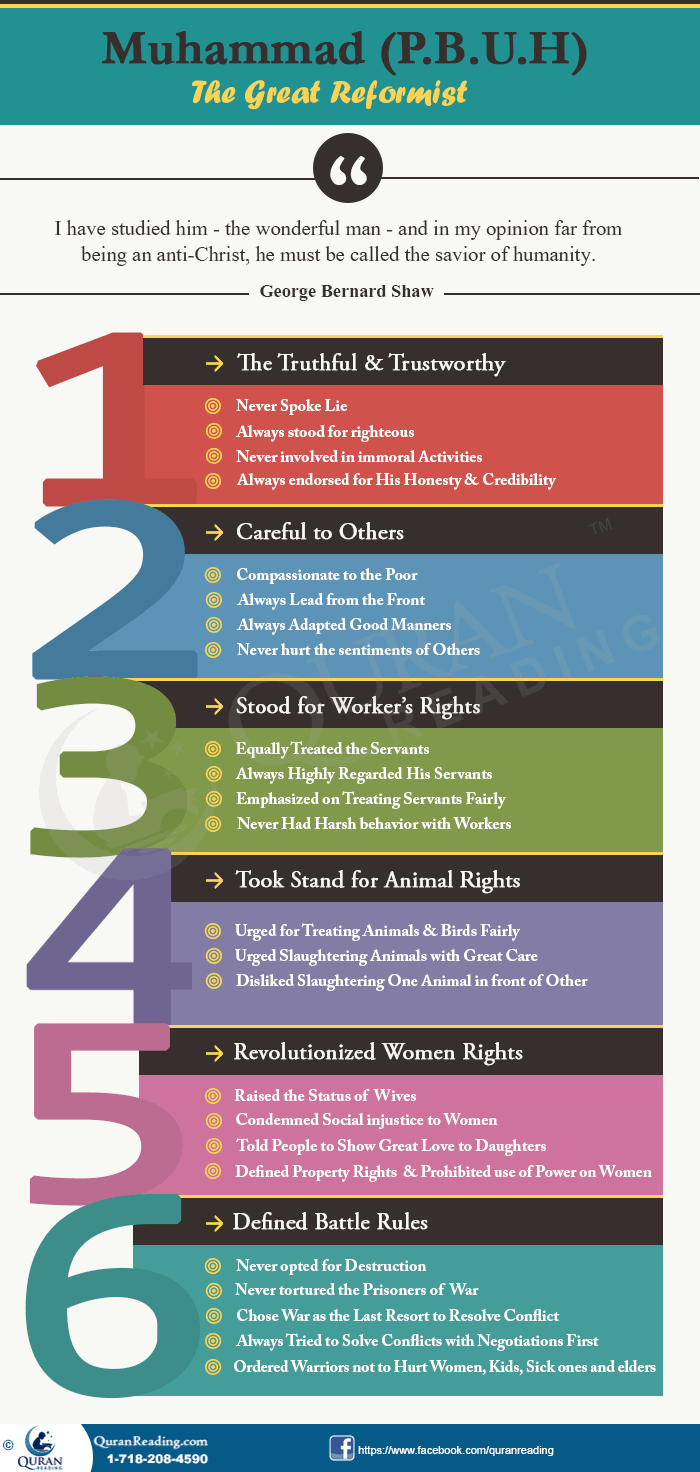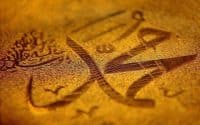
Who Is Muhammad (PBUH) – The Great Reformist

Question– Who is Muhammad (PBUH)?
Answer–The Great Reformist Ever
Over 1400 years ago, on 12th Rabi ul Awwal, in 570 A.D, in the year of Elephant, a child was born to a well respected family of Banu Hashim, in the tribe of Quraish. His mother named Bibi Amina, also belonged to one of the esteemed families of of Quraish, named Banu Zuhra was given good news about the birth of a great future reformist in her dream by the Angel of Allah, who is known as Ahmed, “the praised one” in heavens. She named Him as Muhammad (the praised one) after His birth. The descents of Muhammad`s (PBUH) family are found to be those of Hazrat Ibrahim (A.S) according to genealogy studies. His father, Abdullah died a few months before his birth, His mother also died when he was a few years old, and eventually he was taken care of by his grandfather, Abdul Mutlib. The signs of arrival of a unique one as per teachings of previous religions became evident even before His birth, when a Jew in Madina saw a bright star in the sky, a well known burning fire from thousands of years in Iran turned off by itself, and an intense light originated from Makkah and was seen as far as Syria.
It had always been a divine tradition of choosing Prophets by Allah Almighty among people, who were living in dark ages, and needed to be guided towards righteousness and the remembrance of One God. The Arabs were no exception to this, so Muhammad (PBUH), due to His unmatched personality characteristics, was chosen by the Creator of universe as His Last Messenger when He was 40 years of age and was given the task of Prophet-hood by spreading the religion of peace, i.e. Islam. He started His endeavor by letting others know about the verses of the Sacred Book, the Holy Quran, which is a Godly Scripture and a miracle in itself as no one can reproduce a well balanced, life changing volume like this. He did not only change people`s lives through Islamic instructions within a short period of time, but He also had an exceptional and exemplary personality. But nowadays, due to a popular propaganda by the Western Media, He is said to be a person who spread His word by using force, and relate inhumane activities which are being done by so called Muslim organizations to the teachings of the Prophet (PBUH), which is beyond doubt baseless accusation on Him.

Now we will look back at life of Muhammad (PBUH), which will elaborate to a common man who He really was and what he preached about:
Being Truthful and trustworthy
Right from His early life, Muhammad (PBUH) was well respected among the locals due to His honesty and credibility in matters. Even His worst enemies used to testify of these qualities of His. He always urged others to speak truth, as it is the basis for removal of other immoral activities.
Once a man came to Him, and said “I have many bad habits, and I need your help”. One of those practices was speaking falsehood, and the Prophet (PBUH) directed him to speak truth first. The man promised to do so and went home. After that, he was going to commit robbery at one night, but soon thought of what he would say if he is asked where he was last night, and recollected his pledge of not telling lies. So, he reverted from doing so. Then he was about to drink wine one day which was prohibited, so he did not have a drink because of consequences of his oath and thought he could not lie if asked about his day activity. In this way, he got rid of all his wicked deeds one by one due to inspirational advice of Apostle (PBUH) of Allah.
Due to His integrity, not only Muslims but the non believers too used to keep their belongings under His guardianship, which is why He still had some possessions at the time of immigration from Makkah to Madina. He cared for it and asked Ali (R.A) to return all the items to their respective owners after His departure. Due to such qualities, He was known as As Sadiq (truthful) and Al Ameen (trustworthy) in the society.
Uniting tribes during renovation of the Kaa`ba
As Kaa`ba was always considered as the sacred place of worship, once when it was badly damaged due to floods, the Arabs tribes started to fight among each other for taking privilege of rebuilding it. Only Hajr e Aswad (the black stone which dates back to the time of Adam and Eve) was left behind unbroken, and needed to be placed at its right place. A wise old man made a successful attempt at resolving conflict by suggesting that the first person to enter Kaa`ba in the following morning should take be eligible to do this job. Everyone agreed, and Muhammad (PBUH) was the first one to enter it next day. He (PBUH) spread a sheet on ground, placed the stone on it, and asked the heads of all tribes to lift the sheet together. In the end, He (PBUH) took the stone and placed it properly. That was a moment of His great problem solving ability as every tribe felt having participated in this matter, and were happy. It also shows that He was eager to work for social welfare and harmony even before the arrival of Islamic instructions.
Careful of others` feelings
The Messenger (PBUH) of Allah showed His companions to be selfless and valuing others` time and deemed it as one of essential Human Rights. He used to be gifted fruits from his followers after every harvest. One a poor man brought a single fruit from his little farm. First, Muhammad (PBUH) accepted it, and after tasting it, and kept eating until He heard one of the companions saying about their rights in eating fruit (as Prophet PBUH always used to share presents among them). He (PBUH) smiled and waited till that man had gone. Then, He told His escorts of repercussion behind His action. He said, “The fruit was not ripe yet, and it had a bitter flavor. One of you would have shown this dislike towards it, and hurt that man`s feelings.” So, it shows if a man who cares much about one`s emotions, how much he would excel in fulfilling their greater rights.
Considerate about workers` rights
The holy Prophet (PBUH) also emphasized on treating one`s servants fairly, as at that time, the rich used to be highly harsh in their behavior with their workers. On the other hand, Muhammad (PBUH) was the man who would tie His camel Himself and take no one`s assistance.
“Your brothers are your responsibility. Allah has made them under your hands. So whosoever has a brother under his hand, let him give food as he eats and dress as he dresses. Do not give them work that will overburden them and if you do give them such task, then provide them with assistance.” (Bukhari)
So, it’s a lesson for everyone not to discriminate among people, especially those who work for someone. It has become a common thing to witness the opposite of above Hadith nowadays, as materialism has increased, and wealthy people show high disregard for their servants, which is not the Sunnah of Prophet (PBUH). So, no matter how prosperous someone is, one should consider workers as humans first, and give them their due rights.
Preserving animal rights
Hazrat Muhammad (PBUH) did not only show and stress on protecting privileges of fellow humans, but also used to pay much heed towards defending and awarding due rights to animals. As, once someone disturbed the nest of a bird and took its little ones, the Prophet (PBUH) ordered to place them back in the nest as mother bird was gone crazy over this incident. He also urged us to slaughter animals with great care.
“Do not kill one animal in front of the other, and do not kill the animal twice.” (Muslim)
This shows that animals too have rights and privileges as we are not allowed to slaughter one animal in front of another, so that the other one may not see it and not get disturbed. It means Muhammad (PBUH) demonstrated high regard for animal rights and urged others to treat them well. No one ever would have stressed on taking care of both human and animal privileges in such a well balanced fashion before the Apostle (PBUH) of Allah.
Giving women their due rights
Before the arrival of Islam, the Arabs treated females in highly unjust manner. They used to bury baby girls alive and considered them useless. They had no privileges in their family property, land and were taken as nothing more than slaves. On the other hand, the Holy Prophet (PBUH), as directed by God, the Exalted, gave them their rights of property, and their husbands would be having no power to use it without their permission. Moreover, it was made compulsory for men to take care of all matters related to wife and children with equity. They were also given rights of mahar (marriage settlement) in case husband divorces a lady without her consent. She could also get divorce if she is not happy with her marital life. Women never had enjoyed such privileges before in their life, as men used to have as many wives they wanted to keep and treat them like their own property. But with the arrival of last Prophet (PBUH), women started to enjoy protection, as Muslim men were bound to marry as most four females, that too in case if they can treat them alike. As far as veil is concerned, before the religion of peace, Islam, ladies were looked at as a symbol of attraction and beauty, and men used to tease them while they were crossing by, so Muhammad (PBUH), with the order of Allah, told them to dress in a proper manner so that they could be mistreated as veil would make them recognized as Muslim women. All this discussion makes us aware that the last Prophet (PBUH) only raised the status of females, and did not impose anything on them, but for their own betterment.
Fair treatment in battles
The sole purpose of Muhammad`s (PBUH) Prophet-Hood was to spread the message of the Almighty. He remained peaceful to every limit during this course, which is why He did not opt for destruction of Taa`if community after the Angel of Allah, Jibrael (A.S) offered Him a chance to do so, as they had ridiculed the Prophet (PBUH) and injured Him badly. He rather wished mercy and guidance for them from the Exalted Lord.
When Muslims were being tortured for their acceptance of Islam in Makkah, and the non believers even wanted to kill the Apostle (PBUH) of Allah, He was ordered to migrate towards Madina. Soon after this, Kuffaars (non believers) increased their oppression many folds on those who were left behind. And Muslims were thus ordered to fight battles against them and bring peace to society.
The Holy Prophet (PBUH) declared some of the essential rules of battles which are:
- Asking for Allah`s help only
- Trying to solve conflicts with negotiations and peace first
- If battle is imminent, avoid using deceitful means
- Not to disfigure the dead bodies
- Not to harm children, women, older and sick ones
- Leaving monks ascetics and priests alone
- Not to use or destroy enemy cultivations and vegetations
- Letting ones go who ask for protection after paying something
- Allowing besieged ones to make peace with them
Due to such fairness and justice of the Apostle of Allah, He (PBUH) opted for showing mercy and kindness to all after winning the eventual battle of Makkah. So, the present notion of considering Muslims as violent becomes invalid. Those, who kill innocents and commit hostility, are not the true followers of Islamic teachings, as this is not the way of Allah, nor is the Sunnah of Muhammad (PBUH).
The prominence of the inspirational personality of the Holy Prophet (PBUH) is apparent from the fact that even renowned foreign writers and great non Muslim personalities have praised and testified it including the great Indian leader Gandhi, regarded Muhammad`s (PBUH) outstanding individual characteristics as the means of spread of Islam than the use of sword. Michael H. Hart, an American author, in his Press book “The 100, A Ranking of The Most Influential Persons in History”, ranked Him at the top, and many more such great people have also admired Him after reading His biography. So, to conclude, one can say that Hazrat Muhammad (PBUH) revolutionized lives of millions of people on both religious and secular levels, and has been the greatest reformist ever lived on earth.




